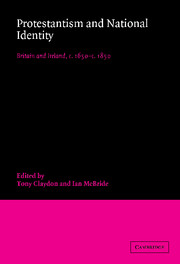Book contents
- Frontmatter
- Contents
- List of contributors
- Acknowledgements
- List of abbreviations
- Introduction
- England
- Britain and Ireland
- 6 The British dimension, religion and the shaping of political identities during the reign of Charles II.
- 7 The bible and national identity in the British Isles, c.1650–c.1750
- 8 Protestantism, presbyterianism and national identity in eighteenth-century Scottish history
- 9 Protestantism, ethnicity and Irish identities, 1660–1760
- 10 ‘The common name of Irishman’: protestantism and patriotism in eighteenth-century Ireland
- Britain, Ireland and the world
- Index
8 - Protestantism, presbyterianism and national identity in eighteenth-century Scottish history
Published online by Cambridge University Press: 16 October 2009
- Frontmatter
- Contents
- List of contributors
- Acknowledgements
- List of abbreviations
- Introduction
- England
- Britain and Ireland
- 6 The British dimension, religion and the shaping of political identities during the reign of Charles II.
- 7 The bible and national identity in the British Isles, c.1650–c.1750
- 8 Protestantism, presbyterianism and national identity in eighteenth-century Scottish history
- 9 Protestantism, ethnicity and Irish identities, 1660–1760
- 10 ‘The common name of Irishman’: protestantism and patriotism in eighteenth-century Ireland
- Britain, Ireland and the world
- Index
Summary
The exact nature of the relationship between protestantism and Scottish national identity in the hundred years between the Glorious Revolution and the outbreak of the French revolution has been obscured by a number of factors. First, the already problematic identity of the Scots within the British monarchy was further complicated as a consequence of the act of union. After 1707, as numberless commentators have lamented, Scottishness took on a more attenuated meaning than in previous centuries, the country having been stripped of some of the trademark paraphernalia of the modern nation-state. Second, the violently contested history of reformed religion within early modern Scotland, perhaps even more than in the rest of Britain, made protestantism a fiendishly difficult matrix within which to construct broad-ranging political or cultural identities. The familiar association of Catholicism with treason was complicated by the continuing alienation of episcopalians from a presbyterian establishment and their simultaneous links with Jacobite subversion, preventing reformed religion from being a constituent of a putative national consciousness for the population as a whole. Third, the historiography of eighteenth-century Scotland has also been unkind to religion in general. As with conventional interpretations of the contemporary history of continental European states, the age of the enlightenment has been regarded widely as one in which primarily religious concerns were at best in retreat among the most influential sections of Scottish society. If not exactly relegated to an insignificant role, religion–protestant or otherwise–has thus been assigned a relatively minor part in the social, intellectual and political lives of the period. It is the collective consequence of these factors that protestantism and national identity in eighteenth-century Scotland have remained relatively unfamiliar and seemingly uncomfortable bed fellows.
- Type
- Chapter
- Information
- Protestantism and National IdentityBritain and Ireland, c.1650–c.1850, pp. 182 - 205Publisher: Cambridge University PressPrint publication year: 1998
- 4
- Cited by



